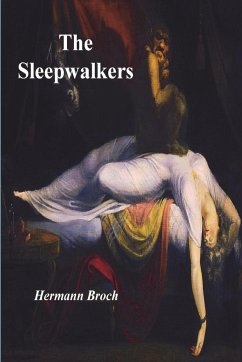First published in the US in 1932, The Sleepwalkers is about three protagonists "sleepwalking", that is, living between vanishing and emerging ethical systems just as the somnambulist exists in a state between sleeping and waking. Together they present a panorama of German society and its progressive deterioration of values that culminated in defeat and collapse at the end of World War I. The novel explores what Broch described as "the loneliness of the I" in its three parts. The protagonists of the first two parts of the book are represented as holding to certain sets of values. Broch describes the struggles they undergo as their codes for living, or values, prove inadequate to the realities of the social environment they find themselves in. Joachim von Pasenow in the first part is "the romantic". In the second part, August Esch tries to live according to the motto "business is business". Eventually, in the third part, the amoral Huguenau's only standard for behavior is his personal profit. He follows this maxim in all his actions, swindling and murdering without remorse. Ultimately, he reaches a point of zero values without remorse and his dealings bring him finally to the zero point of values. Although Broch doesn't hold Huguenau up as someone to admire, he does present him as the inevitable harbinger of fascism. As one reviewer noted, "His characters are sleepwalkers because their own lives are shaped by the forces of the nightmare reality in which they live."
Hinweis: Dieser Artikel kann nur an eine deutsche Lieferadresse ausgeliefert werden.
Hinweis: Dieser Artikel kann nur an eine deutsche Lieferadresse ausgeliefert werden.









